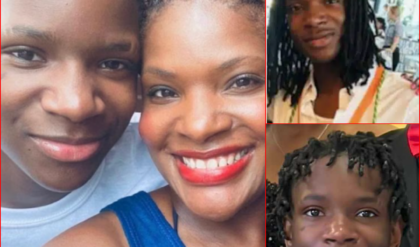ONLY a handful of people knew the real Amy Jade Winehouse. One of them was Dale Davis.
Seventeen years her senior, he became Amy’s band leader and confidante during her years in the bright glare of fame.

Amy Winehouse’s musical director and friend Dale Davis speaks about how the troubled star was just ‘one step away from happiness’ – but it was too difficultCredit: Camera Press

Dale, with Amy, reveals how he spoke on the phone with the tragic star just before she went to bed for the final timeCredit: supplied

Amy, with Dale on bass, performing at the 2007 Brit AwardsCredit: Getty
Dale witnessed euphoric highs as the feisty, vivacious singer from a North London Jewish family took her stellar talent from local jazz clubs to the world stage.
He saw crashing lows as her fateful relationship with Blake Fielder-Civil descended into drink and drug-fuelled calamity.
He spoke to her hours before she died in 2011, aged just 27, telling her she was “the best”.
And today Dale serves as keeper of the flame by running The Amy Winehouse Band, which tours the world to preserve her “important legacy”.
With the Amy biopic, Back To Black, starring Marisa Abela and Jack O’Connell, in cinemas this week, I’m catching up with the amiable bassist.
As the film fiercely divides critics, perhaps it takes someone like Dale Davis to take us to the heart of Amy Winehouse.
“For a long time I was her favourite person to go anywhere with and then I was second after Blake,” he affirms.
“After they split up, I was back to being her favourite person.”
He was the friend she liked to have a laugh with and spin a few records. He also provided her with a shoulder to cry on.
They met in 2003 when Amy — still only 19 and a couple months off releasing debut album Frank — auditioned him for her live band.
Amy Winehouse’s husband Blake Fielder-Civil admits responsibility for introducing her to heroin
“I didn’t get the job at first because she fancied the bass player who went in before me,” says Dale.
“But he was too expensive and only did one show so they called me. I’ve always dubbed myself the uglier, cheaper version.”
‘She loved you hard’
He continues: “I started working with Amy in August 2003, and it was fairly intense for the first 18 months, especially because we were promoting Frank.”
So, what were Dale’s impressions of the budding star?
“When we first met, she didn’t say much because she was quite an awkward character,” he replies.
“But when I started working with her, you could see the love in her.
“If she liked you, she really liked you. If she loved you, she loved you hard. She was a warm, beautiful, generous person who made me feel special right from the off.”
A year after joining the live band, Dale took on extra responsibility as musical director and remained a steadying presence “until the end”.
“Me and Amy got on so well — my role was a natural progression,” he says. “We looked out for each other. I always made sure I had her back and I knew she had mine.
“While being in the public eye appeared very stressful, I enjoyed being with her.
“Obviously, it all ended sadly but it was an honour to be a part of Amy’s world and I would never change it.”
Dale estimates that they played around 170 shows together, the last being a desperate performance by the clearly troubled singer at an outdoor venue in Serbia’s capital Belgrade in June 2011. “That final one was my most difficult night on stage,” he says. “It was all a bit of a shock.
I talked to her at 11.30pm, three hours before she went to bed for the last time, and she was on good form
Amy’s Pal Dale Davis
“To this day, I can’t believe we played for an hour and 20 minutes.
“I think we knew by then that it was the end in terms of Amy singing those songs. She’d got bored with them after five or six years.”
Dale says that prior to Belgrade, there were “lots of cancellations even though we were always ready”.
“It was a funny thing with Amy because I thought she only needed to take one step to be happy — but that step was too difficult.
“She was never far from being OK in my opinion.” Amy and Dale’s final conversation took place by phone six weeks after that disastrous show, on the night before she died at her Camden townhouse.
Clearly finding the memory painful, he recalls: “I talked to her at 11.30pm, three hours before she went to bed for the last time, and she was on good form.
“Amy said, ‘Dale, I’ve just been watching myself on YouTube and I can sing, can’t I?’.
“I replied, ‘Of course you can sing! You’re the best . . . you know’.
“I’m glad she went to bed with that thought. She needed to appreciate she could sing because she was very humble.
“Even at her level, a person can never see it in themselves. “They probably think, ‘Is the adulation real or not?’.
“But to me, Amy is the first star of the millennium.” When the devastating news of her death broke that summer evening of July 23, sending shockwaves around the world, it was hard for Dale to comprehend.
“I was out with her two nights beforehand,” he says. “And she used to ring my house regularly around that time to speak to my wife (now ex-wife) and son.
“However, she did tell my ex that she didn’t think she’d see 28.”
Dale likens Amy to another iconic singer who died at 27: “There’s an element of Kurt Cobain in her.
“They both had very short careers but were massively impactful. My idol is actually Jimi Hendrix — he had a four-year career and that was it.
“There’s a certain mystery when they don’t get a chance to grow old. When they’re young, they chuck this massive spirit in the air and you don’t see flaws so much.”
Dale first became aware of Amy’s extraordinary talent when he was sent a tape of the singer in advance of his 2003 audition.
“It included Stronger Than Me, Take The Box and I Heard Love Is Blind,” he says, referring to the Ivor Novello award-winning opening track and two further songs from Frank.
“The lyrics to Stronger Than Me made me think, ‘OK, there’s a lot of humour in there but it’s also a bit cringe because it’s so powerful’.
“I remember meeting the guy the song is about, Chris (Taylor, an ex of Amy’s), years later and he was so nice.
“As you can imagine, she was very creative with her thoughts and could express herself in a way that touched everyone.”
Dale also recalls that her team “had issues” with their uncompromising singer in July 2004. “They sat down with me at breakfast and said, ‘We’re having problems with Amy’.
“I said, ‘Look, don’t worry about her, she’s fine. She’s a punk. She’s rebellious’.
“For a tiny person, that spirit came out in waves. Her courage and her heart made her so big.”
So what was it like touring with such a mercurial artist?
Dale says: “She always created a great atmosphere. There would be a lot of jokes and laughter backstage.
“On stage, I’d stand behind her and hear incredible performances.
“She would improvise night after night, trying out new things and pushing her own boundaries. She was one of those rare people who could hear something and instinctively turn it into music.”
Dale is also full of admiration for Amy’s other attributes.
“People didn’t always see it but she was very bright and her observational humour was incredible.
“She’d see something funny long before anyone else. She was also a very spiritual person and had more insight than most people are blessed with.”
You could see there were problems with Amy but she didn’t want to talk about them. She just wanted to know how you were
Dale Davis
Of course, Dale also began to witness Amy’s struggles.
We know drink and hard drugs severely compromised her but he has further explanation of her physical fragility.
“This is the sad part of Amy’s story,” he says. “I think the bulimia and lack of sleep killed her.
“When you get tired, which happens when you’re on the road, the nerves and demons start to come out.”
Dale remembers people starting to question Amy’s confidence but he maintains: “She still showed her passion and courage and made everything look easy.”
He accepts that her “private life went off track” and that “when she needed to be on it, as she was getting bigger and bigger, the distractions were there”.
That said, Dale insists: “When someone gives that much, they never get back as much.
“You could see there were problems with Amy but she didn’t want to talk about them. She just wanted to know how you were.”
Though Frank was well-received, her second and final studio album, the all-conquering Back To Black, cemented her legendary status.
Songs such as Rehab, Tears Dry On Their Own and Love Is A Losing Game charted with searing honesty her battles with alcohol and her rollercoaster relationship with Blake.
‘Genuine nerves’
Dale agrees that its success piled pressure on Amy and says: “I never got a chance to tell Amy this and I wish I had . . .
“I wanted to let her know that she didn’t have to write another Back To Black. She didn’t need to.”
One of the last things Amy ever did was sing a duet with her hero, Tony Bennett, on the jazz standard Body And Soul.
Dale says: “I spoke to her five days before she went to do the session and she said, ‘Dale, I’m nervous’, and I said, ‘You’ll be fine’.
“She needed that little push to get it done.
“It was genuine nerves because she was singing with her idol and little did we know she was coming to the end of her career.
“When you listen to the performance, it’s stunning and so natural.
“There was no real obvious technique behind Amy. She was naturally gifted.”
I ask Dale what he believes would have happened had she lived.





